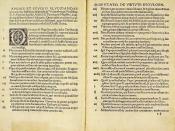The Reformation was one of the greatest disasters that ever struck the social and political scheme of all of Europe. One would think that a call to reform the immoral state of the Catholic Church would bring about greater spirituality and faith, but instead, the European Reformation of the sixteenth century resulted in disastrous peasant revolts that left thousands dead and shook up the political hierarchy of many European nations. The Reformation also created a barrier among people of the Catholic and Protestant religions, a segregation that exists even in modern society (Columbia Encyclopedia). The Reformation affected much of Western Europe, particularly Germany, England, and Scotland, inciting fervent emotions, which unfortunately led to irrational and consequential decisions.
The Reformation began when Martin Luther posted his infamous ninety-five theses on the doors of the Wittenberg church on October 31, 1517 ("Reformation Timeline"). According to the textbook, A History of World Societies, in the early sixteenth century, the church was plagued with immorality, ignorance, and pluralism.
Church officials commonly indulged in drinking, gambling, and promiscuity. Many priests were barely literate because regulations regarding priests' education were casually enforced. Clerics held several offices at once, but instead of taking up the responsibilities of these offices, they just collected revenues from each one. Martin Luther was appalled by these conditions and had a deep desire for reform of the church. Eventually, a new religion formed called Protestantism, which included all non-Catholic Christians. Luther formed new answers to basic theological issues according to his own beliefs. Luther's message had a vast following of people from all social classes, but had a particularly strong impact on the German peasants. Luther came from a peasant background and very much related to them. However, peasants took Luther's defiance of church authority as an affirmative signal to revolt against...

